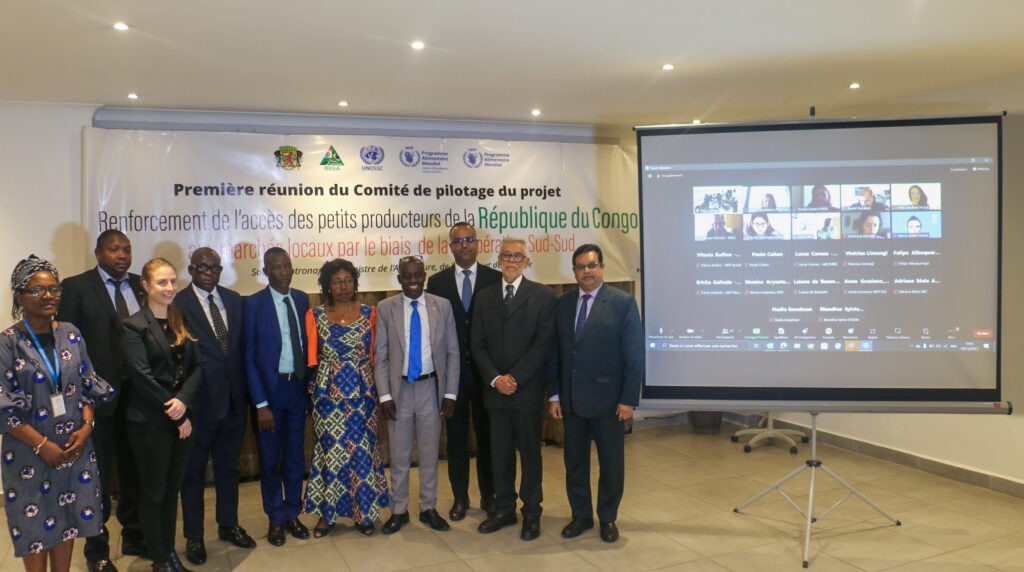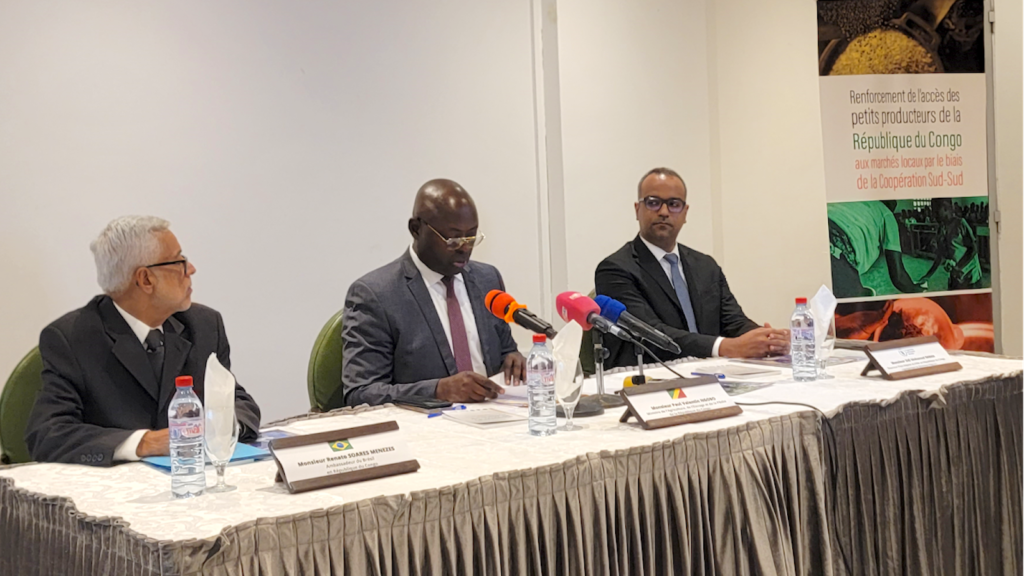 Participants at the inaugural session of the Steering Committee of the project “Strengthening the access of family farmers in the Republic of Congo to local markets through South-South Cooperation”. Photo: WFP/Celia BOUMPOUTOU
Participants at the inaugural session of the Steering Committee of the project “Strengthening the access of family farmers in the Republic of Congo to local markets through South-South Cooperation”. Photo: WFP/Celia BOUMPOUTOU
On 19 December 2023, the Ministry of Agriculture, Livestock and Fisheries (MAEP) of the Republic of Congo in partnership with the United Nations World Food Programme (WFP) held an inaugural session of the Steering Committee of the project “Strengthening the access of family farmers in the Republic of Congo to local markets through South-South Cooperation”.
The main objective of the session was to validate strategic implementation documents of the project, which is funded by the India, Brazil and South Africa Facility for Poverty and Hunger Alleviation (IBSA Fund) in the amount of almost USD 1 million. The initiative is the result of a partnership between the IBSA Fund, the Government of the Republic of Congo, the Government of Brazil, the WFP country office (CO) in the Republic of Congo and the WFP Centre of Excellence Against Hunger in Brazil (WFP Brazil CoE).
The implementation of the project is expected to last two years in the departments of Bouenza, Plateaux and Pool, including the capital city Brazzaville, and aims to strengthen the capacity of MAEP to support smallholder access to local markets, as well as the capacity of the Ministry of Pre-school, Primary and Secondary Education and Literacy (MEPPSA) of the Republic of Congo to develop home-grown school feeding and promote its articulation with the purchase of food from family farming.
“This project is a continuation of efforts made since 2019, in support of the Government of Congo and in collaboration with local, national and international, Northern and Southern partners, to strengthen local value chains, particularly cassava and banana, and improve the scale and quality of the national school feeding programme,” said Sidi Mohamed Babah, WFP Deputy Country Director in the Republic of Congo.
In Congo, food insecurity affects 33.3% of households, with a high prevalence in rural areas, while 38% of the population is undernourished and 19.6% of children under five suffer from chronic malnutrition. Over the years, the country has implemented several initiatives to eradicate poverty through the implementation of the country’s strategic plan and sector-level development strategies and policies.
 From left to right: Ambassador of Brazil to the Republic of Congo, Minister of Agriculture, Livestock and Fisheries of the Republic of Congo and WFP Deputy Country Director in the Republic of Congo. Photo: WFP/Cécile MERCIER
From left to right: Ambassador of Brazil to the Republic of Congo, Minister of Agriculture, Livestock and Fisheries of the Republic of Congo and WFP Deputy Country Director in the Republic of Congo. Photo: WFP/Cécile MERCIER
“This project will transform the lives of many people, improve capacity, facilitate access to local markets, and strengthen food security in the school environment,” said Paul Valentin Ngobo, Minister of Agriculture, Livestock and Fisheries of the Republic of Congo. “Smallholder farmers are crucially important, but they still face difficulty in accessing local markets. So, by facilitating this access, we also seek to facilitate the introduction of their products in these markets, valuing producers,” he added.
Key gaps in institutional capacity, at the political and technical levels, to support smallholder farmers include difficulties in accessing credit and natural resources, insufficient technical assistance services, limited rural infrastructure, weak agricultural modernisation, inadequate food storage and processing practices/equipment, and limited capacity of farmers’ associations/cooperatives.
Daniel Balaban, Director of WFP Brazil CoE, highlighted in his speech that the project will also increase the global visibility of Brazil as a partner for South-South Cooperation for a world with Zero Hunger, and will directly contribute to achieving Sustainable Development Goals (SDGs) 2 and 17. “Finding lasting solutions to hunger is a complex challenge and we all have a role to play. We are confident that this project will create the right conditions for people to have a better and healthier life, that is our goal,” he stated.
Germana Belchior, Advisor to the Presidency of the National Fund for the Development of Education (FNDE), spoke on behalf of the president of the IBSA Fund and stressed the importance of the new project to guarantee the human right to adequate food. FNDE is a part of the Ministry of Education in Brazil and is the entity in charge of managing the national school feeding programme, known as PNAE. “The PNAE can contribute with its experience of almost 70 years of existence,” she said. “Investing in food security for the younger generations is an investment in guaranteeing human rights of all,” she added.
During this meeting, the members of the Steering Committee were briefed on the governance and operational structure of the Project, reviewed and validated the internal regulations, and approved the work plan and budget for the first year. The meeting was also attended by representatives of the Brazilian Cooperation Agency (ABC), MEPPSA, the Ministry of Agrarian Development and Family Agriculture of Brazil, the Ambassador of Brazil and representatives of the Embassies of India and South Africa in Brazzaville and WFP representatives in Rome.
About the Project
Motivated by the request of the Government of the Republic of Congo to participate in South-South Cooperation to advance towards SDG 2, this project aims to enable MAEP and MEPPSA to leverage the knowledge and innovations made available by Brazil and other the IBSA Fund partners for family farming and school feeding.
The overall objective of the initiative is to contribute to the improvement of food and nutrition security of family farmers, especially women, and school-age children, by strengthening the capacity of the MAEP of Congo to support smallholder access to local markets, as well as the capacity of the MEPPSA to develop a home-grown school feeding programme with purchases from family farming, promoting its articulation with the purchase of food from local markets.
Expected outcomes of the project include training of more than 60 national and local technicians of the two sectoral ministries to plan, implement and monitor government programmes aimed at improving smallholder access to local markets, including those in schools; training of about 100 family farmers in the districts participating in the project to improve their food security and nutritional status through improved livelihoods and increased access to local markets, including those in schools; and improving the capacities of 10 schools in participating districts to purchase, store, and prepare nutritious food purchased from smallholder farmers.
